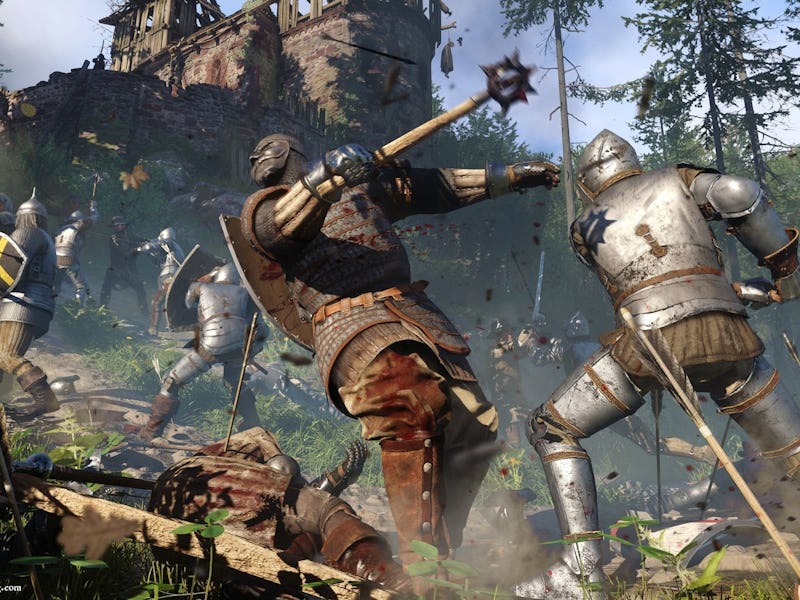How 'Kingdom Come' Doubles Down on History
It's basically historical fiction without the traditional fantasy bits.

That any RPG would venture outside the realms of medieval fantasy is uncommon. There are some outliers, sure, but even they typically embrace a different kind of fantasy. Kingdom Come: Deliverance, with its 15th century backdrop of a civil war that raged in the Holy Roman Empire, is the rare exception.
Warhorse Studios is based in Prague, the capital of the Holy Roman Empire in 1403, when Kingdom Come’s narrative and history takes place. To set the stage: In 1378, King Charles IV of Bohemia — what is now the Czech Republic — died with his son and heir Wenceslas ascending to the throne. By 1400, the Czech nobility had grown tired of Wenceslas’s “idleness” and weakness as a monarch, and they sought to force their king into abdication, gaining aid from his half-brother, King Sigismund of Hungary, who then kidnapped him.
Sigismund then took advantage of the situation, marching his army through Bohemia, pillaging the crippled kingdom. It’s here where Kingdom Come begins, as you play a former blacksmith turned soldier initially out for revenge after your town is burned and neighbors slaughtered by the invading king. The game’s grounded historical approach brought Warhorse huge success on Kickstarter in 2014, naturally fueled by a desire to tell the tale of Bohemia’s past, as I found out recently when I had a chance to see the game for myself. Its sense of period accuracy is overwhelmingly prevalent — even if your character is fictional.
“We see it as kind of the William Wallace effect, because no one knew who William Wallace was before Mel Gibson made Braveheart,” says Tobias Stolz-Zwilling, Warhorse’s PR manager. “So this is another part of history that hasn’t really been touched before, in video games at least.”
This manifests itself in a number of interesting ways. Though Kingdom Come is still an RPG, with bandits to kill and castles to explore, the culture and practices of the time period also play a major role.
One example is in a quest where the protagonist is looking for someone who’s hiding out in Sázava Monastery, a structure still standing today just south of Prague, which players can then infiltrate by impersonating an NPC with the proper identifying parchment. Once admitted, to keep from blowing your cover you must do as the monks do.
“You need to do the monk’s duties, which include praying several times a day, eating with the monks and even [translating] books,” Stolz-Zwilling says. “There’s a reading skill in the game — and the information you get from books are necessary for quests, so you need to really read to understand.”
As the game still has to be fun, there are some breaks with complete accuracy. You could just as easily kill everyone in the monastery and deal with the consequences to your reputation — perhaps not the most realistic of outcomes. Warhorse’s full-time historian also argued with the team over the unrealistic prospect of simply being able to join a monastery in the 15th century, hence the need to come up with a narrative workaround. Another compromise is found on the locks on doors in villages, a vital component for any RPG with a lockpicking skill.
“Locks were relatively easy back then, but we had a problem that most doors didn’t have them,” Stolz-Zwilling says. “They had a wooden bar on the inside. But you can’t lockpick that from the outside. Locks with keys were usually used only in castles and such.”
The notion of quests seems like a puzzle too. Without being able to fall back on monster hunting, how do you make a medieval RPG work? That was also a question of cultural immersion.
“There are no quests like, ‘go in my basement and kill 15 spiders’ or something,” he says. “The quest should be somehow down to earth, something people might have suffered back then, or had problems with.”
This might stem from the political strife from Sigismund’s invasion or simply the beliefs people had.
People will talk about the invading forces, and they will talk about magic — there was clearly no magic, but you might have to brew some kind of potion which they believe is some kind of magic, even though its just a placebo,” Stolz-Zwilling says. “We want to throw you into a world that existed 600 years ago.”
Though Kingdom Come will force you into many battles with a variety of period weaponry, perhaps the most refreshing thing about it — and the best reminder this is medieval history rather than fantasy — is there’s no grand ascension to power.
“In the beginning of the game you’re a no one, and in the end of the game, you’re less of a no one, but still a no one,” says Stolz-Zwilling. “You will never become a king, ruler, or troop leader.”